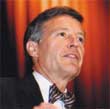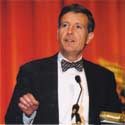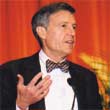Spring 2001
Batten Symposium: Keynote Highlights
Reid Ashe Calls for Raising Value of News
By Reid Ashe
Publisher
The Tampa Tribune

It’s a special privilege to speak at the presentation of the Batten Awards. Jim Batten meant a lot to me, as he did to all of us who had the privilege of working for him. Jim was my boss during an especially exciting time in my life, the year-and-a-half I led a project called Viewtron.
Viewtron was an online service ahead of its time. When Viewtron was launched in the early 1980’s, there was no public access to the Internet and almost no PCs. Viewtron didn’t do well and we wound up closing it. But the experience left me with profound respect for the Knight Ridder organization and for the leadership of Jim Batten and of his boss at the time, Alvah Chapman.
…Jim Batten was never a publisher. He was an editor, and we remember him as one of the great editors of his age. As CEO of a Fortune 500 newspaper company, he supervised dozens of publishers but never held the title himself.
Still I like to think of Jim as a publisher’s patron saint. Whenever I face an especially tough problem, I find myself wondering, “What would Jim have done?”
…Jim was good at a lot of things, but he was especially good at managing the tension between business and journalism.
…Amid uncomfortable compromises, Jim maintained his passion. His passion was about values and his compromises respected the integrity of the conflicting positions. The point was to find the best solution.
Jim created an environment in which you knew what mattered and you knew you were going to be heard. Jim set an example of caring – caring about the job and caring about each other. That was the environment in which we dealt with conflict.
In that kind of environment, it came naturally to look, amid conflict, for common ground.
Civic journalism was one of those areas of common ground. From the start, civic journalism was designed to build readership, community and civic capital. It was supposed to be good for journalism, good for business and good for our communities.
My former colleague Buzz Merritt once observed that this was one of the first times that editors discussed readership without laying the blame on the business side and its incessant demands for higher prices and tighter budgets.

This was introduced as a revolution in journalism – a way to repair society’s broken connections and reinvigorate democracy. In retrospect, I think we either promised too much or people expected too much. Civic journalism is not a solution. It’s an approach.
The movement encouraged us to experiment with new techniques, but there was nothing radical about its goals and values. This is a personal opinion, of course, but I think we could have as easily presented civic journalism as a “back-to-basics” movement and thus avoided some of the pompous denunciations with which the movement was greeted.
In fact, it goes all the way back to the fundamentals of human nature. No matter how much we bowl alone and build houses without front porches, no matter how much we isolate ourselves in office cubicles, in single-passenger cars and in front of the TV set at night, humans will always be social animals. We still need a sense of belonging and a chance to participate in shared institutions.
Journalism, I believe, should create a virtual town square, where readers can participate in the social, cultural, political and economic life of the community – without having to gather in the same time and place.
The image I carry in my head is of the primitive marketplace. It’s the agora, the souks, the bazaar, a clamorous place you could find near the heart of town in every traditional society. Vendors came to sell their goods, attracted by the knowledge they’d find buyers. Buyers came for the best selection and most competitive prices.
It was a place to haggle and trade, but it was more than that. It was also a place to find magicians and musicians, evangelists and healers. It was a place to renew friendships, tell stories, play games, arrange marriages and, whether openly or covertly, discuss politics.
…Let’s get back to the theory of civic journalism. It says the problem with newspapers, and the problem with society, is that people are losing their sense of belonging. Political institutions have grown adept at manipulating the public as they polarize debate. Journalists abet them, portraying constructive debate as debilitating conflict, looking for winners and losers, covering everything as a zero-sum game. If you’re looking for reasons to tune out politics, to give up on city hall, to vote for none of the above, you’ll find them in abundance in the typical news report.

Yet human nature doesn’t change, except over hundreds or thousands of generations. We will always have basic needs as social animals. We’ll always need a sense of belonging.
We belong to many things. We belong to a culture. We embrace a set of traditions. We participate in an economy and in markets for goods and for our own labor.
We even preserve some forms of tribal ritual. Let me give you a personal example. Before I moved to Tampa five years ago, I’d barely heard of our NFL team, the Buccaneers. This past year I barely missed a game. I know many of the players by name. Why? Because every Monday morning during the football season, that’s what people are talking about. You can’t avoid it. Talking about the Bucs has become a tribal ritual. It lets us begin an encounter by establishing our common loyalty. It’s a form of recognition, a sort of tribal grunt.
This, too, is a need that’s fed by newspapers. We are, or should be, the medium for all manner of social and cultural interaction. Our role is not just to report the news, but to give people a sense of belonging.
There was a time when news held its own value. People who lived in isolation would eagerly await the next ship or the telegraphed report. Today we’re awash in a sea of news. It’s everywhere – on the radio, the television, the Internet, even on our pagers and Palm Pilots. News has become a commodity, its value driven down by abundance.
We have to find ways to raise the value of news. The value is not in the raw information. It’s in its ability to support linkages and relationships and to facilitate participation.
Buzz Merritt gave us the image of the lonely lineman, out in miserable weather repairing a broken cable, strand by strand. That’s his view of the civic journalist, out repairing severed connections – between journalists and communities, citizens and community institutions, citizens and each other, citizens and their newspapers.
…It’s all about connections.
Now let’s talk about another way to make connections, the Internet. This has been a real “Field of Dreams.” We built it and they came. The problem was, they didn’t bring money.
We all played out our dreams.
- Publishers dreamed the Internet was a newspaper.
- To broadcasters, it was a TV set.
- To retailers, it was a store.
- To bankers, it was a branch.
- To investors, of course, it was a bust.
But the Internet is here to stay.
It’s useful to remember that before the Internet, we had things we called online services. They had names like The Source, CompuServe, Prodigy, America Online. We almost had the Microsoft Network. These were like shopping malls. Each offered wide-ranging services, but only those within the mall.
The Internet blew these guys away. The ones that are still in business are either Internet service providers or services on the Internet. They couldn’t compete with the Internet. The Internet is a direct connection to everything, and that’s why people want it.
That’s one of our challenges. You can find almost anything on the Internet – school lunch menus, trash collections schedules, neighborhood association meetings. There’s more information about city hall and the school board on the Internet than we can ever publish in the newspaper. It’s more than information. You can find like-minded citizens and join their mailing lists. And you can find new competition for classified ads.

But even as the Internet creates paths around us, it also gives us a marvelous new tool. We can update our stories all day and tell them in unlimited space. Readers can discuss them in the same virtual space. We can integrate video and interactive maps, and put an archive at the reader’s fingertips. We can enhance advertising with deep, searchable information. We can use sophisticated software to match buyers and sellers.
This is important, because as civic journalists, our job is to make connections. And here we have a tool that sends messages, from anywhere to anywhere else, with blazing speed, in elaborate complexity. This is for us!
It didn’t take long for us to discover that readers could write back to us and to each other. Some journalists saw this as a nuisance. Our mailboxes get cluttered with nut mail, but we also pick up good leads.
We moved on to some things we couldn’t do in the newspaper. We created online guides to community life. We found ways to augment our classified ads. We began to make our databases available online. What really sets the Internet apart from every medium that preceded it, though, is its inclusion of all manner of user-generated content.
Journalists are instinctively wary of user postings. We haven’t screened them. They’re often slanderous or wrong or politically incorrect. They are, however, the real world, and they’re going to be out there whether we like them or not. If we attach them to our own sites, we can give them a sense of direction if not a constructive purpose. This is public participation in its rawest form. It’s not always pretty. But it’s close to the heart of our mission as civic journalists.
…I began this talk with some reflections on the stress of hard times. Make no mistake. We’re getting whipsawed. Advertising is in retreat, yet newsprint prices are continuing to rise. We’re facing and making tough choices. Most of us are beyond the point of doing more with less. Now we have to do less with less still.
There are two ways to cope with stressful times. The natural tendency is to put your head down and revert to familiar patterns. The other is to decide what’s fundamental and preserve it at the cost, if necessary, of everything else.
Civic journalism, among its many benefits, gives us a way of setting priorities. It says we’re here to talk about the shared interests of our community, the things that will stimulate civic discourse and make connections. It says the Internet is a tool that lends itself to the task. And it suggests that all of this supports our efforts to build a commercial marketplace.
There are no easy answers, but there are better ways to do hard things. I learned this from Jim Batten: Agree on values, treat people with respect and look for common ground. That’s a good approach to management, and to journalism too.
